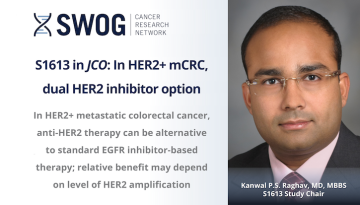SWOG Member Site Highlight: SCOR NCORP
A few weeks back, I asked you what you wanted to learn about SWOG, from this space. One of the great ideas you suggested was regularly highlighting a member institution. I’m happy to oblige!
It seemed only right that I should first highlight our leading accruer, so this Front Line profiles the Southeast Clinical Oncology Research Consortium, Inc., (SCOR) NCORP. They were the top NCORP accruer to SWOG trials in both 2020 and 2021. During 2021, they enrolled almost 200 patients to SWOG studies.
SCOR have in the past also been the top NCORP accruer to Alliance trials (each year from 2017 to 2020) and NRG Oncology trials (in 2021). With more than 150 clinical trials open at their sites, clearly, they know their business when it comes to enrolling patients onto cancer trials!
Their ability to lead accrual in more than one cooperative group at a time is in part due to their size – they’re one of the largest of the NCORPs, with 76 affiliates and sub-affiliates in 23 communities across six states throughout the southeast US – Florida, Georgia, North Carolina, South Carolina, Tennessee, and Virginia.
In each of these 23 communities, a community responsible investigator (CRI) and a study coordinator manage participation in NCORP activities and oversee accrual to NCI trials. These affiliates and sub-affiliates are home institutions to almost 250 investigators -- medical oncologists, surgeons, radiation oncologists, and gynecologic oncologists – and to more than 300 other research professionals involved directly or indirectly in the clinical research endeavor.
Dr. William J. Irvin, Jr., is now the contact (main) PI for SCOR, having stepped into that role on August 1, 2022, replacing Dr. Judith Owen Hopkins, who remains a SCOR PI. Dr. J. Daniel Pennington is the third SCOR PI. SCOR also has a new lead administrator as of August 1, with Michele Harmon, RN, BSN, taking over that role from Susan S. Tuttle, RN, CCRP. These leaders are aided by a staff of eight who oversee day-to-day operations of the NCORP from an operations center in Winston-Salem, NC.
The history of SCOR as SCOR begins with the founding of the NCI’s NCORP program, but the community clinical oncology programs (CCOPs) that would become SCOR were conducting cancer trials long before that. When the funding opportunity announcement for the new NCORP program was posted in 2013, the then Southeast Cancer Control Consortium, Inc., CCOP, based in Winston-Salem, NC, and the then Upstate Carolina CCOP, in Spartanburg, SC, (both SWOG members) submitted a joint application. When the NCORP grant was awarded in 2014, the combined group became “SCOR,” and James Atkins, MD, and James Bearden, III, MD, were principal investigators.
In their first years, SCOR formed a cancer care delivery research (CCDR) committee to identify strengths, interests, and strategies for conducting and participating in CCDR studies. They also convened a disparities committee (now their health equity committee) to increase the participation of minority, rural, and underserved populations in their studies, and in their current grant year they’ve been particularly successful in accruing larger percentages of rural (30 percent) and minority (16 percent) participants to NCI clinical trials.
SCOR also maintains its own cancer advocacy advisory board, to integrate the voices of cancer patients, survivors, and caregivers in the NCORP’s activities.
A particularly notable initiative is SCOR’s young investigators program, which identifies early to mid-career oncologists with an interest in becoming SCOR leaders. These future leaders submit a letter of interest and their CV to the SCOR principal investigators. Those who are selected as good candidates for the program are integrated into the SCOR leadership structure, and each is paired with one of the NCORP’s PIs as a mentor. They’re also educated in SCOR history, policies, and procedures.
If the measure of an organization is how well it achieves its stated mission, then SCOR is a resounding success. Its stated mission is this: “Provide NCI clinical trials to improve the lives of cancer patients by bringing practice-changing clinical trials to the communities where patients live and work.” They achieve this on a grand scale, and SWOG is proud to have them as one of our most effective members!
Other Recent Stories



